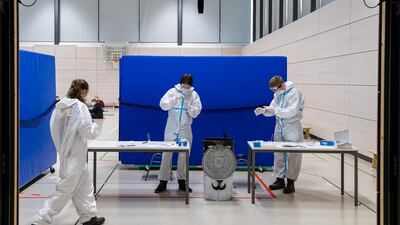Germany should prepare for a “drastically more difficult” third wave of the coronavirus to infect unvaccinated people, a leading virologist said.
Prof Christian Drosten, director of the Institute of Virology at Charite Hospital in Berlin, said the more infectious UK variant was now the dominant strain in Germany, accounting for three in four cases.
Germany and several other European nations suspended use of the AstraZeneca-Oxford University vaccine citing blood clotting concerns.
The European Medicines Agency said on Tuesday it was “firmly convinced” there is no evidence linking the shot to thrombosis.
It said it would continue to analyse data before making a decision on use of the vaccine on Thursday and that there were 30 cases involving blood clots reported among the five million people given the AstraZeneca vaccine in the 30-nation European Economic Area.
Scientists are worried the suspension could increase scepticism of the AstraZeneca drug in Germany after it was initially recommended only for people under 65 because of a lack of data showing it was effective in older people.
Prof Drosten predicted things could be “tricky” for unvaccinated people over 50 when coronavirus cases surge.
“Shortly after Easter, we will have a situation like around Christmas,” he said, referring to soaring infections that led to a hard lockdown late last year.
Germany reported 13,435 new infections and 249 Covid-related deaths on Wednesday, and scientists said the country must resume using AstraZeneca’s Covid vaccine to protect the population.
One senior medical figure said the pause was a “catastrophe” that would damage public trust in the vaccine and set back the struggling inoculation campaign.
“This vaccine, which is actually good and effective, will not exactly achieve more acceptance in the population thanks to all this fuss and the suspensions in many countries,” Frank Ulrich Montgomery, the German president of the World Medical Association, told newspaper group RND.
The German health ministry said it had a duty of care to suspend the AstraZeneca shot while seven blood clot cases were investigated, adding that only 1 to 1.4 cases were statistically expected with 1.6 million vaccinations.
It warned of "legal consequences" if it did not inform people about the vaccine's potential link to blood clotting.
A YouGov survey published on March 7 found people in the UK were far more likely to trust the AstraZeneca drug than mainland Europeans – 81 per cent said it was safe and 79 per cent said the same of the Pfizer-BioNTech shot.
In Germany, 66 per cent said Pfizer-BioNTech’s was safe, compared with 43 per cent for AstraZeneca.
Prof Jeremy Brown of University College London said European fear of the risk of blood clotting linked to the AstraZeneca vaccine was “overblown”.
"I don't understand why this is happening. To me, it doesn't seem at all logical – the vaccine prevents about 85 per cent of admissions to hospital after one dose, even in the very elderly and the frail," he told BBC Radio 4's Today programme.
He said that halting distribution of the vaccine would “cause more illness and more death”.












